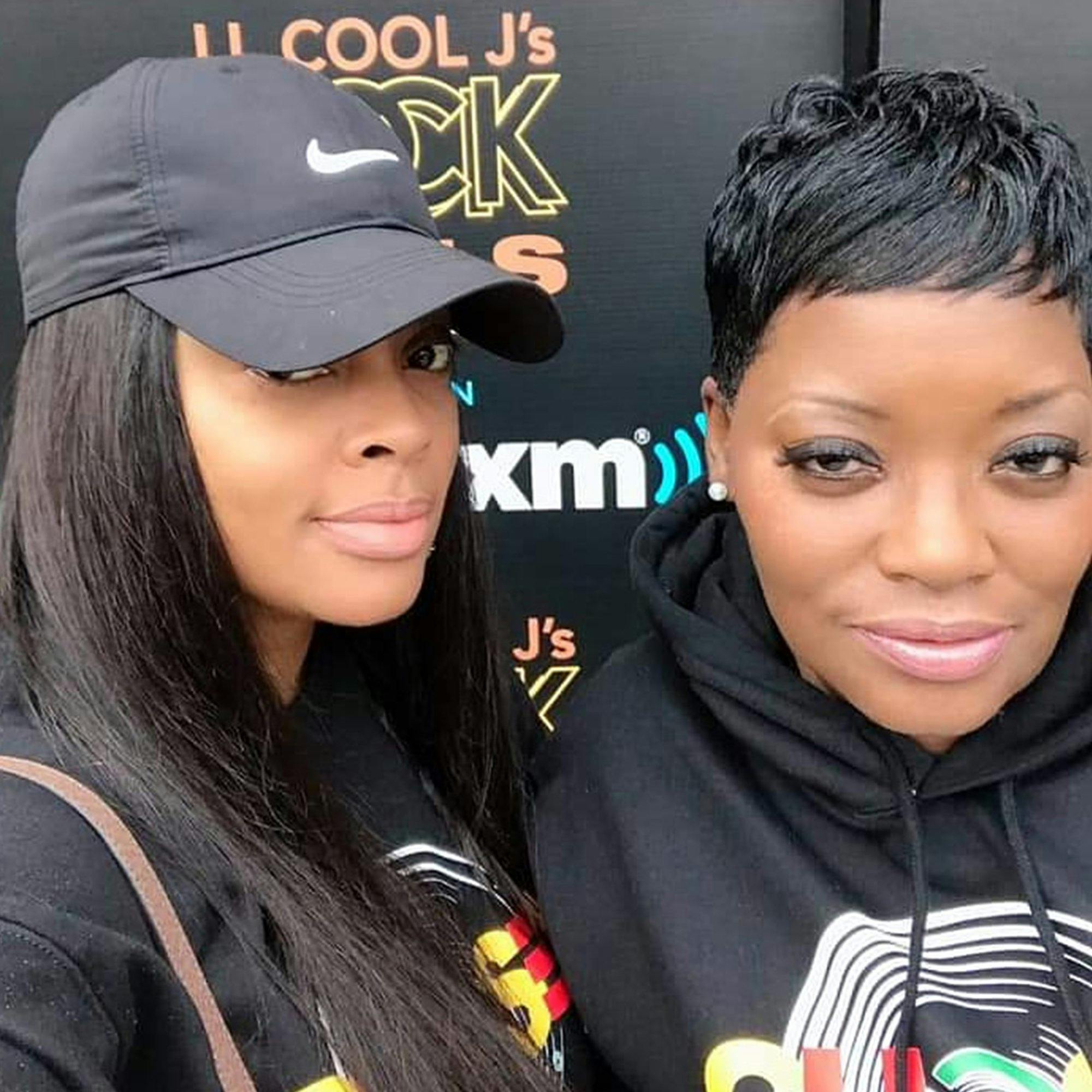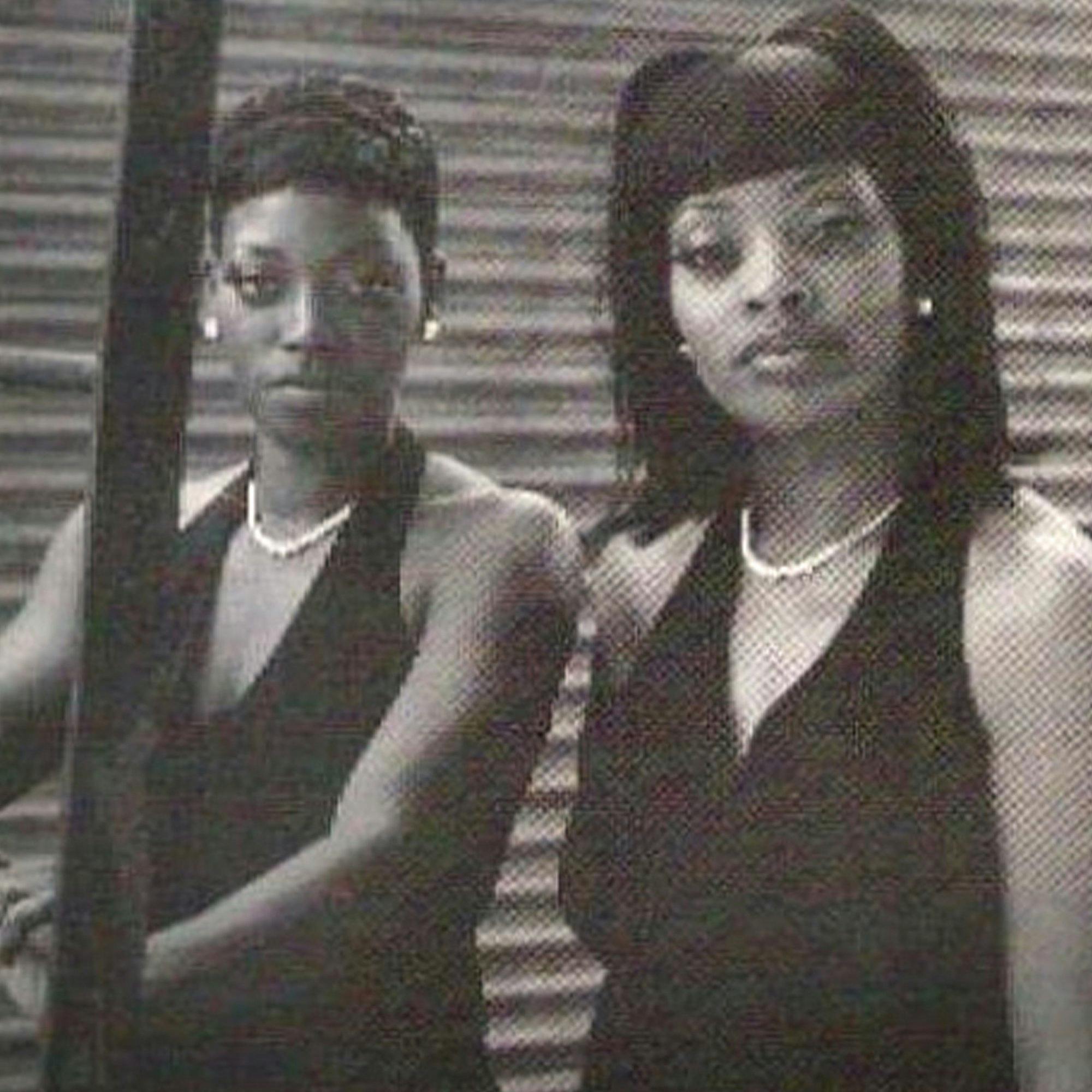
In 1986, Frick and Frack staked a claim as Hip-Hop innovators from the Southside, Jamaica area of Queens, New York City. Consisting of the sisters Nadine and Adriane Greene—MCs who rapped as "Frick" and "Frack" respectively—the duo's debut, "You Shouldn't Have Done It," was a cautionary crack era tale that recounted the travails of a cast of real life neighborhood characters over crunching drums and dub-inflected bass tones that were hooked up by Juice Crew superproducer Marley Marl.
"We were the first rap group that came out of Southside to be played on the radio," recalls Frick. "You had the South Bronx and Queensbridge, but we were Southside,” adds Frack. “We were opening the door to the world to see what's coming out of Southside.”
Born and raised in Southside, Frick and Frack grew up in a household that was soundtracked by soul, reggae and gospel. The sisters started writing R&B songs when they were barely five-years-old. The Jackson 5 were an initial inspiration. Then came the impact of the Sugarhill Gang—along with Blondie's “Rapture”—and the growing emergence of Hip-Hop in the pop culture world. Closer to home, the sisters witnessed their brother, who went by the MC name "YG," become a fixture on the nascent local scene as he performed at outdoor spots including Van Wyck Park and Lincoln Park.
"I'd watch him in awe on the mic with his crew," says Frick. "Then I heard a girl come out that was my age which was Roxanne Shante and I was like, if she can do it, I'm definitely doing it. I started listening to her song ["Roxanne's Revenge"], and was like let's put this rap together and let's see how it sounds."
Around this time, Frick and Frack would hang out with Sandra Denton, who would soon become widely known as Pepa from fellow Queens-based rap group Salt-N-Pepa. "That's another reason, we said if Sandy can make a record we can definitely make one,” says Frack. "Salt-N-Pepa came out in '85 with "The Showstopper" and we came out in '86. We all used to hang together."
The duo remembers there being friendly competition among their fellow female MCs, but they also fostered a sense of solidarity.
"Roxanne Shante is still one of our best friends in the industry today," says Frack. "We never had a problem with anybody to this day."
Living in Southside, Frick and Frack were able to utilize The Grate studio, which was based close to their house and was run by Hanky Grate. Future Run-DMC producer Larry Smith was also known to work out of the spot. The duo recorded their demo at the studio; one of their cousins utilized a connection to Marley Marl to facilitate a meeting with the producer off the strength of the demo tape.
Traveling by subway to Marley Marl's home studio in the Queensbridge public housing complex, Frick recalls a humble setup that involved two turntables, an 808 drum machine, a couple of microphones and foam-covered walls to provide noise reduction insulation. Along with Marley, the Juice Crew's MC Shan was present during that first session, which lasted for around two hours. Frick remembers Marley asking them to perform their lyrics a capella, after which he "just came up with a beat behind the rap; he came up with the dopest beat ever."
She adds that while Frick and Frack weren't official members of the Juice Crew at the time, they knew they faced competition from Shan, Roxanne Shante and Biz Markie to secure a prized Marley Marl beat. "Marley, I guess he was like the Dr. Dre back then," explains Frack. "If you didn't come with the right lyrics, you didn't get no beats."
Frick admits she felt nervous during that inaugural recording session, (“I couldn't even catch my breath!"), but the sisters recorded "You Shouldn't Have Done It" in just two takes. The song was released in 1986 on Romil Records, a label run by the the producer and musician Ronald Miller, who was also behind the ‘80s studio outfit Raw Silk. “You Shouldn’t Have Done It” was credited to the group name Frick and Frack, which was how a neighborhood figure called Lance used to refer to the sisters when he’d see them out together.


The concept behind "You Shouldn't Have Done It" involved sketching short scenarios about various characters whose lives and fortunes become derailed by crack addiction.
"When we wrote that song we were in the crack era and we wanted people to pay attention to what was going on," explains Frack. Her sister adds that the characters in the track were "absolutely word for word" based on real people they knew. "They loved the song so I was like, well, I guess they don't know!"
After DJ Red Alert played "You Shouldn't Have Done It" on the radio, Frick and Frack secured a show at legendary Hip-Hop club the Latin Quarter. Joeski Love, who was running high on the success of his hit "Pee Wee's Dance," was also on the bill; the sisters recall a who's who of royal Hip-Hop figures being in the audience, including Rakim. The notoriously demanding Latin Quarter crowd booed the announcement of Frick and Frack at first, but after taking the stage to a reggae-influenced introduction, the sisters won the crowd of an estimated 2,000 people over. Frick and Frack shortly went on to become the first Hip-Hop group to perform at the notorious Rikers Island jail complex.
Back in the studio with Marley Marl, Frick and Frack continued writing and recording. Two tracks completed during that time, ”Go Southside" and "Who's On Mine," wound up being released on volume 18 of the influential Street Sounds Electro series of compilations, which were released in the United Kingdom. The former track bubbles along with a melodious loop which the two MCs embellish with tight but playful and harmonic flows; the latter is defined by an ominously rumbling bass line and industrial-tinted percussion. Recalling the creation of "Go Southside," Frick admits that when they originally recited their rhymes at Marley Marl's studio, she overheard "the whole Juice Crew was outside laughing at us like it was the wackest record." Retreating home, Frick and Frack brainstormed a new direction for the track. "The first version was a little faster and it didn't have a harmony," she explains. "The words were all the same, but we went back and developed a technique with more harmony and that's how we flowed.” This time, she adds, the Juice Crew gave the performance their collective seal of approval.
While Juice Crew MC Big Daddy Kane was completing his 1988 debut album Long Live The Kane, he invited Frick and Frack to appear on the song "Just Rhymin' With Biz."
During an ad libbed introduction, Biz Markie shouts out Frick and Frack being "in the house," and towards the end of Kane's original verse, the MC signs off with the lines, "Frick and Frack if you're with me/ Pick up the microphone and just hit me.” Frick and Frack recorded rhymes to close out the track—but the released version ends abruptly before they can appear. It transpires that industry label politics scuppered the duo's appearance. "They [The Juice Crew] got signed to a different label and it was a case of do we negotiate to get them on? But instead they just kinda cut it off from there," explains Frick. (An alternate version of "Just Rhymin' With Biz,” reputedly played by Mr. Magic on his "Rap Attack" radio show, includes Kane's appearing to pass the mic to Frick and Frack.)
At this juncture in their musical career, Frick says the duo "kinda went our separate ways" from the Juice Crew and started to co-produce their own music. After "Go Southside," the sisters' grandmother passed away. Taking time to regroup, Frick and Frack returned with 1989's "Look Out," which teamed the MCs with the DJ Grandmaster Vic. "With Marley, we was never really signed to the Juice Crew so we was kinda independent all along," explains Frick. "When we came back, they were signed to Warner Bros and they were doing different things and we found another label, Invasion Records."
Asked whether they would have attempted to navigate the Hip-Hop industry differently with hindsight, the sisters say they're more than content to have stayed true to their artistic values and beliefs. "I felt if I'm writing my own rhymes, I should be in control of where I want to be," reasons Frick. ”Half of the artists back then had a writer, so we felt like, no, that's not where we want to be. Would I have done it differently? I don't think so. A lot of people do things to get places and we weren't those people, that's what I'll say.”
Since retreating from the front lines of the music world, Frick and Frack have focussed on running the Revived Wear clothing line, which they launched in 2014. They also recently launched a Revived brand of bottled water. Testament to the bonds Frick and Frack formed with other artists back in the ‘80s, Roxanne Shante has hosted the yearly Revived Hope breast cancer awareness walk which the sisters organize.
Looking back on their breakthrough period back in the '80s, Frick says she’s proud of how the duo’s trailblazing moves helped their Southside neighborhood springboard. "I feel we definitely had a part coming from where we came from," she reflects. "We were a stepping stone for some of the artists that came out like Onyx, Nicki Minaj, Lost Boyz, G-Unit, a lot of artists that are out there making so much money from our community and it feels like it kept going up from South Jamaica. The legacy itself is opening the door.”



